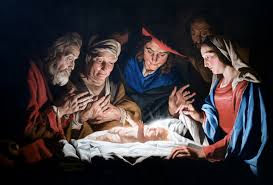The Infancy and Childhood of Jesus
Luke 2:21-40 and Matthew 2:1-23

Though Christian tradition and art have frequently portrayed both the shepherds and the magi visiting the newborn Yeshua simultaneously, they are never associated or mentioned in the same breath within the gospels. Luke shows no hint of knowing about the wise men, and Matthew never mentions the shepherds. When the wise men come to visit Jesus in a house, they saw the child with His mother (Matthew 2:11a). Only Mattityahu describes Joseph and Mary’s escape to Egypt to avoid the murder of their son at the hands of Herod the Paranoid (Mattityahu 2:13-18), and then their return to Nazareth where Jesus spent His childhood growing up (Matthew 2:19-23). The shepherds worshiped Messiah in a manger (Luke 2:16); but, the magi worshiped Christ in a house (Matthew 2:11). Consequently, the accounts of the shepherds and the magi are separated by at least two years.
Except for the escape to Egypt, it is important to note that the gospels have no record whatsoever on Christ as a child. For Mark and John it is Messiah’s adult public ministry, ending in His death and resurrection, which make up the gospel. Nowhere in the gospels does the adult Jesus refer directly to His own childhood in His teaching. Matthew and Luke, however, contain stories about Yeshua’s birth and infancy.
Yet the four gospels stand in stark contrast with those that come to us from the mid-second century onwards – the apocryphal stories about Jesus’ so called “missing years” before His baptism.124 For example, the false gospel of Thomas was discovered in 1945. It was part of the popular genre at that time, written to satisfy a hunger among early believers for more miraculous and anecdotal stories of the childhood of Christ. In this false gospel, Yeshua supposedly breathes life into birds made from clay, curses a boy who becomes a corpse, and curses another boy who falls down dead and whose parents become blind.
As believers we should restrain from this kind of desperate search. God has not left us as orphans. He has given us everything that we need for victorious living today. As Rabbi Sha’ul said: Now we see but a poor reflection as in a mirror. Once we are in heaven, we shall see the Lord face to face and understand more of this life than we do at this time. Now we know in part; but then we shall know fully (First Corinthians 13:12). ADONAI is not holding anything back on us. What we don’t know now, will be revealed to us at the proper time. He has provided for us fully and completely.



I have heard Mr Chuck Missler point to Psalm 69:8-12 as somewhat an allusion or parallel of the young Jesus. How true is this?
Psalm 69:8-12 is Messianic in the fact that it pictures Messiah on the cross, bearing our sins, and enduring the mocking from different groups. See my commentary on The Life of Christ files Lu – Jesus’ First Three Hours on the Cross for the details.
Verses 10 to 12 doesn’t seem to imply a singular day event, but an experience, or a series of actual events to which it is applied. We do know David was thought of to be born outside wedlock and even singled out by his brothers. Doesn’t verse 5 contradict its application to the Messiah?
Joseph and Mary were betrothed, which in the Jewish culture at the time was the same as being married. As far as Matthew 12:5 is concerned, the Messiah was prophesied by Micah 5:2 to be born in Bethlehem. So not only does Matthew 2:5 not contradict its application to the Messiah, it strengthens it.